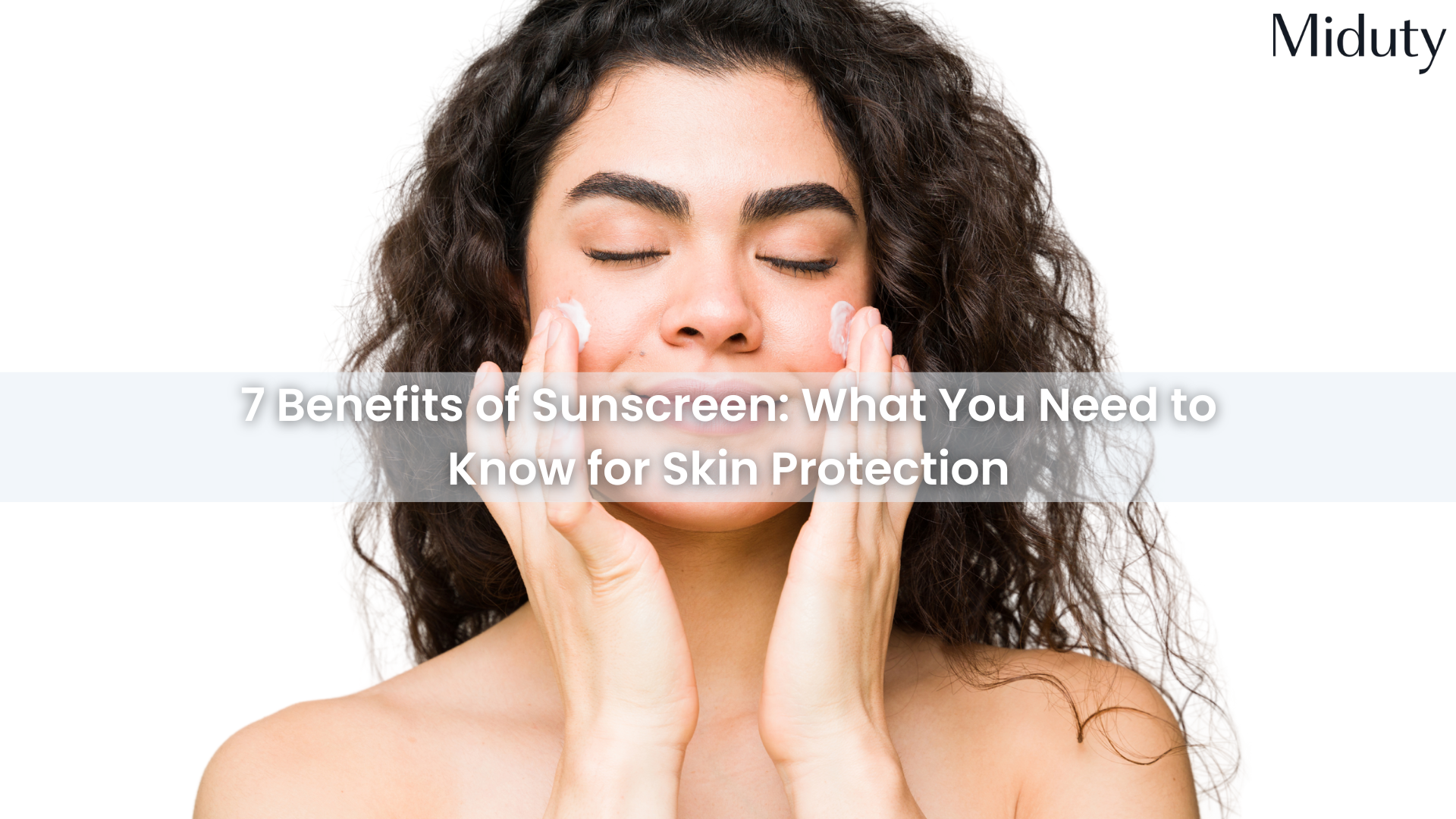
7 Benefits of Sunscreen: What You Need to Know for Skin Protection
Key Takeaways:
- SPOILER: There is no such thing as waterproof sunscreen
- Remember to wear sunscreen even when you are indoors.
- Remember to apply sunscreen daily as it can help prevent skin conditions and contribute to a more even complexion.
- Wear at least SPF 15 daily and use broad-spectrum sunscreen to protect against UVA and UVB.

Sunscreen has evolved into a crucial component of any skin care regimen, and its significance cannot be overstated. Whether you're worried about premature aging, sunburns, or lasting skin damage, sunscreen stands as your strongest shield.
Sunscreen is more than just a summer essential-it's a year-round must-have for anyone looking to protect their skin from the harmful effects of the sun. While many people think sunscreen is only necessary for beach days or sunny vacations, the truth is that UV rays can damage your skin even on cloudy days or when you're indoors by a window.
Using SPF(Sun Protection Factor) daily not only shields your skin from sunburn but also helps prevent premature aging, wrinkles, dark spots, and more serious concerns like skin cancer. In short, incorporating sunscreen into your skincare routine is one of the easiest yet most effective ways to maintain healthy, youthful skin.
This article will explore the myriad benefits of sunscreen, shining a spotlight on its protective qualities for the face, its ability to remove tanning, and its positive impact on skin appearance.
Delving deeper into the reasons why sunscreen is indispensable may ignite a newfound commitment to incorporate it as a non-negotiable step in your daily routine.
Table of Contents
1. The Science Behind Sunscreen
2. The 7 Sunscreen Benefits on Face
3. Choosing the Right Sunscreen for Maximum Benefits
4. Does Sunscreen Work Indoors?
5. How to Incorporate Sunscreen Into Your Daily Routine?
6. Conclusion: Sunscreen is Your Skin's Best Friend
8. References
The Science Behind Sunscreen

Sunscreens are classified as both organic (chemical) and inorganic (physical). Organic compounds, like oxybenzone and octinoxate, act like sponges to absorb UV radiation. Inorganic compounds, containing zinc oxide and titanium dioxide, work to shield the skin by reflecting and scattering UV radiation. [1]
Sunscreen works by either absorbing, reflecting, or scattering ultraviolet (UV) rays. UV rays are the primary cause of skin damage, leading to burns, premature aging, and even skin cancer.
Two types of UV rays affect the skin-UVA and UVB. UVA rays penetrate deeper into the skin and are responsible for aging, while UVB rays cause burns.
By using a broad-spectrum sunscreen, you get protection against both types of rays. Many people believe sunscreen is only necessary on sunny days, but UV rays can penetrate clouds and even windows, which makes it crucial to wear sunscreen daily.
The 7 Sunscreen Benefits on Face
1. Prevents Sunburn
The most obvious benefit of sunscreen is its ability to prevent sunburn. Sunburn is not only painful but can also lead to long-term skin damage. Over time, repeated exposure to sunburns increases the risk of skin cancer, particularly melanoma. [2]
Applying sunscreen regularly helps shield your skin from the harmful effects of UV rays, keeping your skin healthy and pain-free.
2. Slows Down Skin Aging

Aging is a natural process, but too much sun exposure can speed it up. Sunscreen helps to maintain the skin's youthful appearance by protecting it from UVA rays, which are responsible for premature aging.
Consistent use of sunscreen reduces the formation of fine lines, wrinkles, and hyperpigmentation. The benefits of sunscreen on the face are especially noticeable over time, as it helps your skin stay smoother and more vibrant.
3. Prevents Skin Cancer
Skin cancer is one of the most common cancers worldwide, but it is largely preventable with the use of sunscreen. According to dermatologists, one of the primary benefits of sunscreen is its ability to reduce the risk of skin cancer, including melanoma, which can be life-threatening. Broad-spectrum sunscreens with SPF 30 or higher offer significant protection. [3]
4. Prevents Tanning

For those wondering, "Does sunscreen prevent tanning?" The answer is yes. Sunscreen works by blocking UV rays, which are responsible for darkening the skin. While sunscreen won't prevent tanning entirely, especially if you're out in the sun for extended periods, it will drastically reduce the intensity of tanning.
To avoid tanning altogether, reapply sunscreen every two hours and after swimming or sweating.
5. Helps Reduce Hyperpigmentation and Dark Spots

Another common question is, "Does sunscreen remove tan?"
While sunscreen itself does not remove an existing tan, it helps prevent further skin darkening and the development of sunspots. Over time, with consistent sunscreen use, your skin can recover from the effects of tanning and appear more even-toned. Sunscreen also prevents new hyperpigmentation from forming, which is crucial for maintaining a balanced complexion. [4]
6. Improves Skin Texture
Sunscreen not only protects from UV rays but also helps maintain the overall texture of your skin. UV damage can lead to rough patches, dry skin, and even acne flare-ups. Using sunscreen daily, especially on the face, can lead to softer, more supple skin. The sunscreen benefits for the face are particularly significant, as the face is constantly exposed to the elements.
7. Promotes Overall Skin Health
Sunscreen helps protect your skin from the harmful effects of UV rays, supporting the skin's natural repair process and reducing oxidative stress. It plays a crucial role in maintaining your skin's integrity, which is important for long-term skin health.
Additionally, sunscreen acts as a protective layer that can boost the effectiveness of other skin care products, like moisturizers and anti-aging treatments. [5]
Also Read: How to Apply Sunscreen on Face? : 5 Easy Ways for Maximum Protection
Choosing the Right Sunscreen for Maximum Benefits

Not all sunscreens are created equal. Here's what you should look for: [6]
1. Broad-Spectrum Protection
Ensure your sunscreen provides broad-spectrum protection, shielding you from both UVA and UVB rays, which is essential for protecting your skin against all types of sun damage.
2. SPF 30 or Higher
For daily use, dermatologists recommend using sunscreen with at least SPF 30. Higher SPF values provide more protection, but SPF 30 blocks about 97% of UVB rays, which is sufficient for most people.
3. Water-Resistant Formulation
If you plan to swim or sweat, a water-resistant sunscreen is a must. Water-resistant sunscreens offer prolonged protection during activities, but they still need to be reapplied regularly.
4. Lightweight and Non-Greasy

Remember that when it comes to the benefits of sunscreen for your face, it's important to use a lightweight, non-greasy formula. Heavier formulas can clog pores and cause breakouts, especially if you have oily or acne-prone skin. Make sure to look for sunscreens labeled as non-comedogenic.
Also Read: Sunscreen or Moisturizer First : What to Apply? - Learn the Right Skincare Order for Better Results
Does Sunscreen Work Indoors?
Many people think that sunscreen is not needed indoors. SPF indicates how effectively a sunscreen guards against UVB rays. For example, SPF 15 filters about 93% of UVB rays, SPF 30 shields 97%, and SPF 50 offers 98% protection. Experts typically advise choosing an SPF between 30 and 50, as it provides ample protection without the misconception that higher SPFs offer complete coverage.
Sunscreen is generally not needed indoors due to low sun exposure risk. However, although windows can block UVB rays, UVA rays can still penetrate glass and harm the skin. Therefore, it is important to wear sunscreen even when indoors, especially if you spend time near windows or in front of screens, as blue light can also affect the skin. [7]
UVR (ultraviolet radiation) from the sun includes UVA, which causes skin aging and cancer risk, and UVB, which leads to sunburn and cancer. Glass blocks UVB, and laminated glass can fully block UVA.
If the UV index is 3 or higher and you're stepping outside occasionally during the day, it's wise to include sun protection, such as sunscreen, in your routine.
How to Incorporate Sunscreen Into Your Daily Routine?
1. Apply Sunscreen After Moisturizer
Sunscreen should be the last step in your skin care routine before makeup. Apply it generously on all exposed skin, focusing on areas like the face, neck, and hands.
2. Reapply Every 2 Hours
Sunscreen wears off over time, especially if you're sweating or spending time outdoors. To maximize the benefits of sunscreen, reapply every two hours, or immediately after swimming or sweating.
3. Don't Forget Hard-to-Reach Areas

Often, areas like the ears, the back of the neck, and the tops of the feet are neglected. These spots are just as vulnerable to UV damage and should be covered with sunscreen.
Conclusion: Sunscreen is Your Skin's Best Friend
Sunscreen has numerous benefits beyond preventing sunburn. It helps protect against skin cancer and premature aging and maintains a healthy, even complexion.
If you're wondering, "Does sunscreen prevent tanning?" or "Does sunscreen remove tan?" the answer is that while it won't remove an existing tan, it plays a vital role in preventing further skin darkening and sun damage.
Sunscreen should be non-negotiable for healthier, younger-looking skin. Make it a part of your daily routine, regardless of whether you're spending the day indoors or outside, and your skin will thank you in the long run.

Frequently Asked Questions on Benefits of Sunscreen -
Q1. What are the benefits of wearing sunscreen?
Wearing sunscreen is one of the best and easiest ways to protect your skin's appearance and health at any age. Regular use of sunscreen helps prevent sunburn, skin cancer, and premature aging.
Q2. Does sunscreen make skin glow?
Sunscreens usually contain hydrating ingredients it and using sunscreen every day is essential for preventing premature aging and maintaining youthful, radiant, and well-hydrated skin, making the skin glow. [8]
Q3. Is sunscreen good for your face every day?
Applying sunscreen to your face, neck, chest, ears, hands, and arms daily is recommended to prevent long-term damage from the sun. It is usually recommended to include sunscreen in your morning skincare routine. [9]
Q4. Can sunscreen remove dark circles?
A well-formulated skincare routine should include daily broad-spectrum sun protection with a product rated SPF 30 or higher to address this common concern in the eye area. Sun damage is a surprising hidden cause of dark circles, so sun protection is crucial.
Q5. How long does SPF 50 last?
Under average conditions, SPF 50 sunscreen typically lasts for about 3 to 4 hours. If you're active, sweating, or in an area with intense UV exposure, it's advisable to reapply SPF 50 sunscreen every 2 to 3 hours.

References








